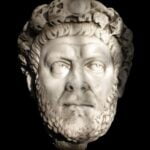It is very difficult to overestimate the influence of the Roman Empire on the history of the world. In addition to architecture, language, alphabet, art, various technologies, a certain political model, ideology, is very important, recognizing Rome as a city that is given power over the whole world. Rome, however, in the 5th century CE collapsed… but the idea has survived and is still used successfully in some countries to this day.
The Orthodox monk Philoteus of Pskov, who lived at the turn of the 15th and 16th centuries, wrote in a letter to the Muscovite prince Vasily III: Observe and see to it, most pious Tsar, that all the Christian empires unite with thine own. For two Romes have fallen, but the third stands, and a fourth there will not be. Thus the ideology of Roman imperialism gave rise to Russian imperialism, which, through tsarist imperialism, through the imperialism of the Soviets, is still being reborn in our eastern neighbour.
It is worth recalling that also in Western Europe the legacy of the “Empire” inherited from Rome was used for ideological purposes: first by Charlemagne, who considered himself the successor of the Emperors of the western part of the Empire, then by the German Emperors, whose title was until 1806: Imperator Romanorum. This title gave (in theory) sovereignty over the entire Christian world. In the more recent past, Benito Mussolini also referred to the imperial legacy of Italy in an attempt to restore “First Rome” to its original place – that of the ruler of the whole world.






